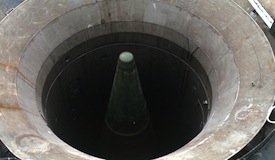$180 Billion for Nuclear Complex Upgrades in Advance of New START
May 13, 2010
Featured Image
Nuclear Complex Upgrades Related to START Treaty to Cost $180 Billion - Walter Pincus of the Washington Post [link]
- The Obama administration, seeking to bolster congressional support for the new strategic arms treaty with Russia, plans to spend $180 billion over the next decade to upgrade the nation's nuclear weapons complex, keep warheads capable and modernize strategic delivery systems, according to documents delivered Thursday to the Senate Foreign Relations Committee.
- Republicans have been insistent that they would not support the treaty unless the U.S. nuclear weapons complex is modernized so that more nuclear weapons can be built if needed.
- The summary [of the administration's report] shows that spending on modernization of the nuclear weapons complex over the decade will reach $80 billion, growing from $6.4 billion this year to $7 billion in coming years and eventually topping $8 billion beginning in 2016.
- The growing costs reflect not just construction of facilities but also the refurbishment and possible replacement of some warheads in the next decade, all without the need for testing, according to the summary.
The New START Treaty Sent to the Senate - White House Advisor Brian McKeon in the White House Blog [link]
- Today the President submitted the New START Treaty to the United States Senate. Before the Treaty can be ratified, the Senate must provide its advice and consent by a two-thirds majority.
- In addition to the Treaty, the President also sent a report to Congress required by last year’s National Defense Authorization Act on our plan to modernize our nuclear weapons complex and the strategic systems used to deliver nuclear weapons over the next decade.
- The President wants to reduce the role of nuclear weapons in our security policy, but has made clear that as long as we rely on nuclear weapons, they must be safe, secure and effective.
- That’s why he has increased the budget for our nuclear weapons complex by nearly 10% in the coming fiscal year, and committed to spend $80 billion over the next decade.
- We believe the agreement makes Americans safer and hope that the Senate will continue the history of the past two decades of overwhelming bipartisan support for nuclear reduction agreements.
Obama Team Working to Counter Iranian Outreach as Sanctions Game Enters Final Stretch - The Cable in Foreign Policy [link]
- As the sanctions drama at the U.N. moves into what the Obama administration hopes are its final stages, the Iranian government is busily trying to conduct its own diplomatic outreach, including an attempt to convene an international meeting of some Security Council members in Tehran.
- U.S. officials are arguing that after hearing Iran's pitch, those council members still resisting sanctions -- a group that includes nonpermanent members Turkey and Brazil -- will have no more excuse to hold up the process.
- "During [Secretary Clinton's] call [with the Turkish foreign minister], the secretary stressed that in our view, Iran's recent diplomacy was attempt to stop Security Council action without actually taking steps to address international concerns about its nuclear program," said State Department spokesman P.J. Crowley.
- We are hearing that the U.S. goal is to pass a sanctions resolution by the end of May, but most diplomats don't expect it to get done until at least mid-June. U.S. officials are expressing increased confidence that the resolution will pass and will not get vetoed.
A View from the Dark Side
A Late Look at a Troubling Treaty - Peter Brookes in the New York Post [link]
- From the looks of it, sinking the treaty in the name of our national security might be the best thing to happen to the Son of START.
- To meet the new START-mandated warhead limits of 1,500, the United States must eliminate nearly 80 more warheads than Russia does.
- While treaty limitations may match this administration's (misguided) missile-defense vision, the question is whether START will hamstring future administrations dealing with yet-to-be-determined threats.
- A sea of experts worry about whether a US drawdown would undermine American deterrence, a bedrock of our defense policy, encouraging other potential rivals to bolster their current or planned arsenals.
- The Obama team may come to regret its secretiveness and "generosity" with our national security when the Senate begins to ask some tough questions on this treaty next week.



